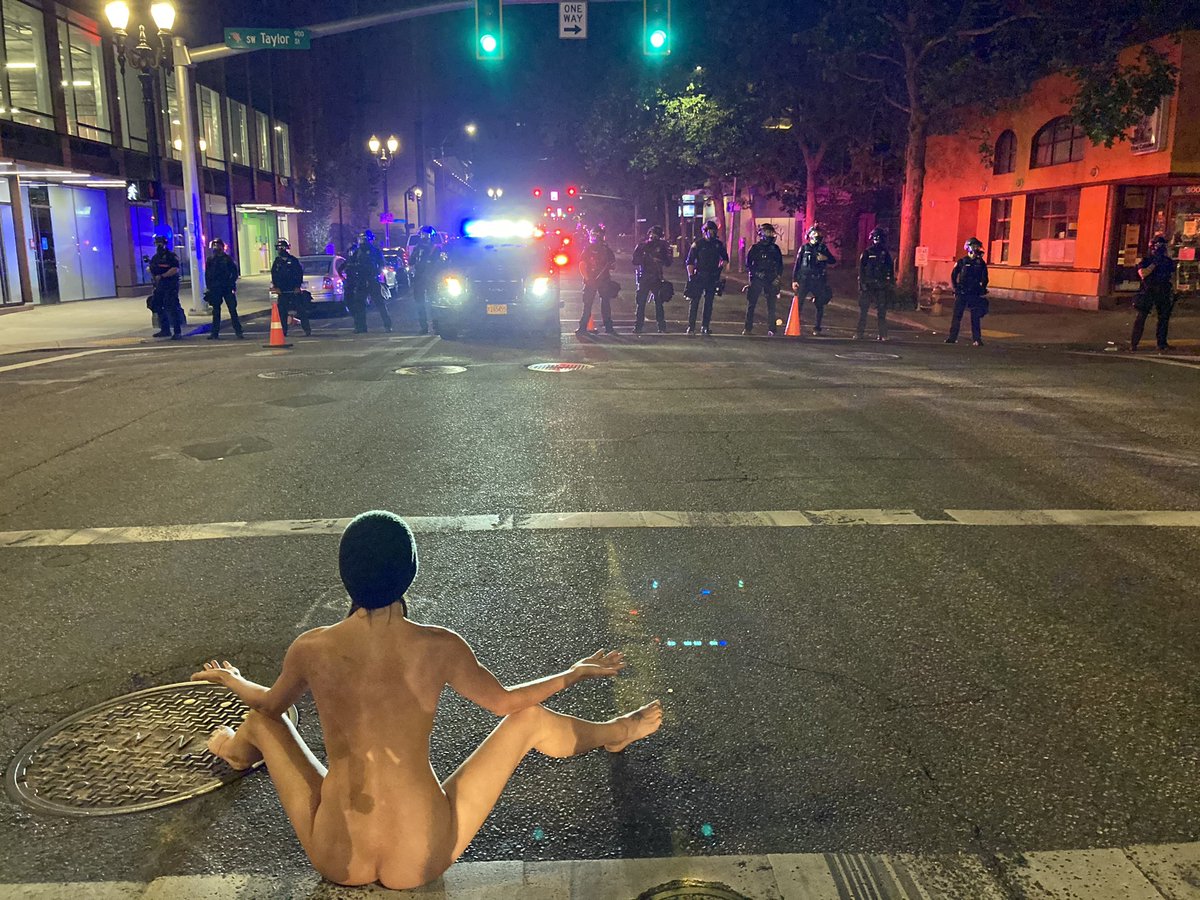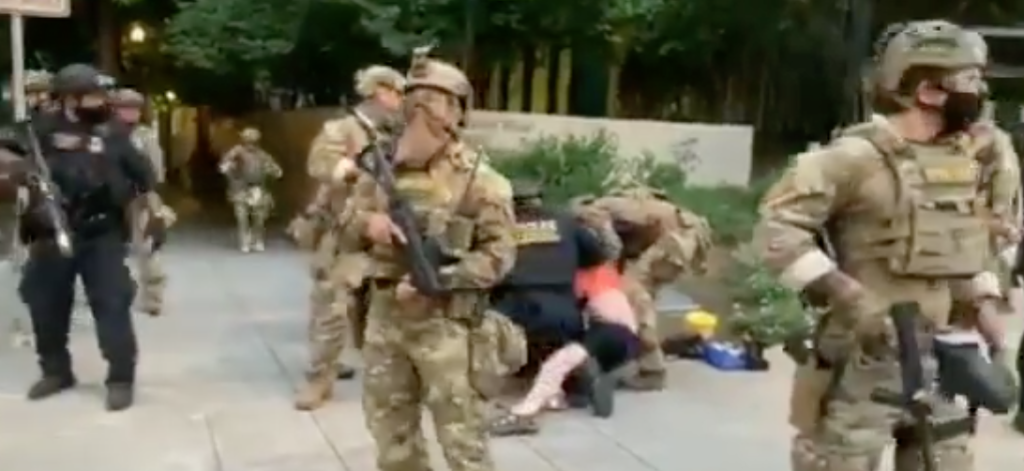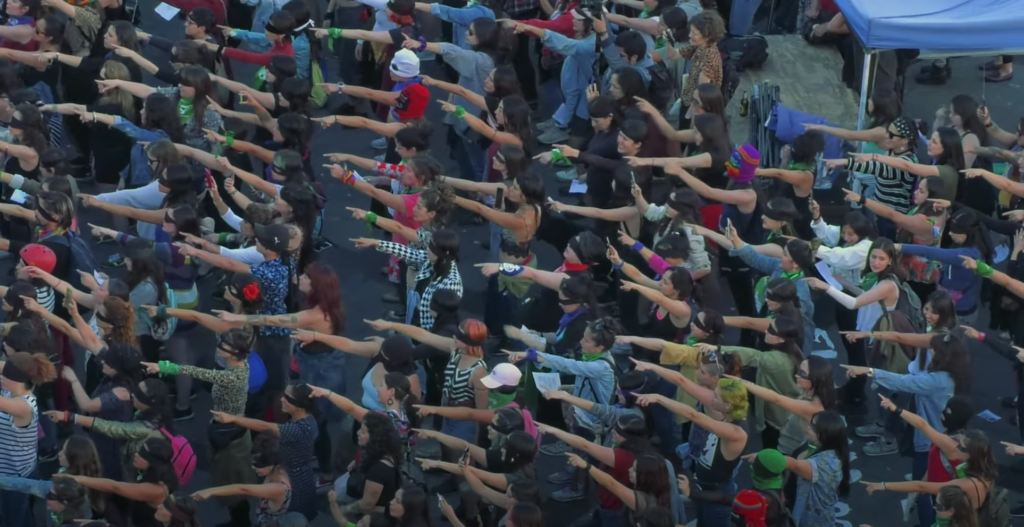In the early morning of July 18, during one of a series of recent confrontations between residents of Portland, Oregon and the federal government, reporters in the field captured one of the most impactful images to date of the popular protests that have riveted the United States since the May 25 murder of George Floyd by Minneapolis police officers.
In photos that have now appeared in print nationally, a woman, who appears to be either white or white-passing and cisgender, sits upright in the glare of the headlamps of a police SUV, naked on the asphalt with her head masked and covered, legs abducted from her midline. Her arms rest on her knees, palms facing upward in a gesture of offering.

The pose suggests itself as yogic, but I don’t know whether it is or what its meaning might be if so. What transcends the pose is the way the body is opened fully to the oppressors in a display of strength and fearlessness. In the press, she has been dubbed “Naked Athena.” According to reports, following a standoff of about a quarter of an hour, the police retreated from the intersection, as Athena remained in triumph.
Portland has served to recapture for protestors against police violence some of the attention of the national media, which had lately been noticeably flagging. The criminal activity of the federal side, whose tactics have included brazen, unconstitutional and violative arrests, has spurred escalation in the streets of the city. This escalation has been best exemplified perhaps by the growing cadre of predominantly white mothers interposing themselves between the protestors and the federal agents, and, in another way, by Athena herself.
Athena’s turn at the head of a small band of demonstrators Saturday morning was well-received by journalists, who praised the woman’s grace, bravery, and vulnerability in the face of the masculinist, fascist threat made manifest maybe a dozen feet in front of her.
A year before, almost to the day, Jane Doe, a Black woman living in Lancaster, California, in the high desert north of Los Angeles, was dragged out of her home into the summer sun by deputies of the Los Angeles County Sheriff, naked and visibly menstruating. While her young sister and her neighbors watched, Jane was forced to lay face down by armed men who then bound her legs, pressed their knees into her back and neck, pushed her face into the ground, and searched her body.
Jane’s abuse at the hands of the state was documented by her thirteen year old sister, who was also forced outside without a shirt on by the deputies, who were executing a search warrant on their residence. The obvious fact that she was not a threat to police who had forcibly entered her home with assault weapons drawn while she was in the shower was underscored by the later revelation that they had been looking for Jane’s brother, who had already been booked in jail by the time they arrived.

In news footage, an anchor describes the way that Jane was “hog-tied” by leering deputies that Jane says uncovered her to look at her body, who forced her back down when she attempted to cover herself, and told her to stop resisting arrest. Jane’s case was covered locally by journalist Jasmyne Cannick and some local outlets, but has failed in large part to generate the attention that Athena did.
Jane faces a long and challenging battle against the legal resources of the county of Los Angeles to secure a modicum of restitution for the harm that the Sheriff’s Department has done to her and her family, while knowing full well that she will be subjected to pro-police and anti-Black vitriol, and that there are so many things that a monetary award can never repair.
Of the two, the case of Jane Doe gets more at the heart of the current moment in America. Ten months before the death of Floyd in Minnesota, Jane was forced to the ground by officers claiming that she had resisted an arrest that made no sense, that followed no logic beyond the self-insulating patterns of racism. Unlike Athena, who wore her anonymity (and that of the agents of state violence) as a source of performative power, Jane’s anonymity is a legal fiction.
The reality is that Jane’s authority over her body, as well as her own modesty, and any of a lifetime of perceptions she had sought to cultivate personally, were ripped from her while she was at home. Not in a vacant intersection in the dead of night, but on a crowded block in the late morning, Jane was forced into her confrontation with the state. She cannot undo the violence her government visited upon her.
It’s enough to make one wonder, beyond the thrill of a successful – and sure to be imitated – confrontation, whether there is any point that a white body like Athena’s can make that also applies to a Black body like Jane’s in America.
None of this is to suggest the actions of Athena were not brave. On a human level, they required bravery in the utmost. To face down the armed agents of the state, to see in their eyes that they will harm you, and that they are possessed of an unsettling conviction in their right to do violence, all of these things require bravery.
Instead, what we see is a performative bravery, a prop performance the stage for which is open only to a few and to which the props have brought themselves. But it is not given to Blackness to treat the police as props, it is rather whiteness that converts them thus – and that is more to the point.
Are we to believe these federal agents in Portland were stunned into a withdrawal by a single naked protestor? Or that they were somehow sufficiently awed by Athena’s demonstration to withhold from committing violence against her? It’s a dangerous conclusion. The state power being wielded here cares little about human bodies – and that, too, can be seen in Portland.

Video from Oregon in the past week has shown brutish tactics from the Department of Homeland Security, including, in one instance, federal agents descending without a word on Dr. Juniper Simonis, a white transgender woman writing in chalk on the sidewalk, forcing her to the ground, and violently searching her person. Dr. Simonis screams in terror, and then, as the officers continue violating her, begins to shout “I am a woman. Get these men off of me.” No one does.
There is a moment in captured video where Athena, intentionally or otherwise, recalls “Un violador en tu camino,” the sensational feminist protest anthem created by Valparaiso’s Colectivo LASTESIS during the Chilean mass demonstrations that began last year. With her head masked, she points to the skirmish line of federal enforcers before her.

One can very nearly hear the bone-rattling shout from the Global South: “El estado opresor es un macho violador.” And, in Portland as in Chile, those words still ring.

For many, Athena will symbolize bravery and grace and vulnerability. Bravery that can be worn as an alter ego is simpler to elevate than is that type of bravery which is required daily of a Black Jane Doe in Los Angeles for whom there is no safe point of remove from white supremacy. To be sure, Athena’s grace, too, relies in some not insignificant measure on a construction of femininity which is shared in common by members of the press and by the foot soldiers for the Trump regime. The same umbrella will never keep Black Americans out of the rain.
This country is flooded with racist preconceptions about black skin, even for professionals whose vocation is to preserve life rather than take it. Doctors in training report at astonishing numbers that they believe myths about Blacks having thicker skin and feeling less pain. Black women themselves are frequently excluded altogether from the racist idealization of womanhood which holds sway in the minds of Americans. And we need only recall the death of George Floyd, begging for his mother as his murderer told him, “If you can talk, you can breathe,” to see ultimately that there is no protection in vulnerability for Black Americans.
When we ask then what white bodies can tell us about Black bodies in America, we should not assume the answer is nothing, but we should observe first the differences. Whose bravery is seen and whose goes unremarked? Who gets called graceful and who has to find grace in themselves? Whose vulnerability is a statement of authority and whose vulnerability is a product of subjugation?
